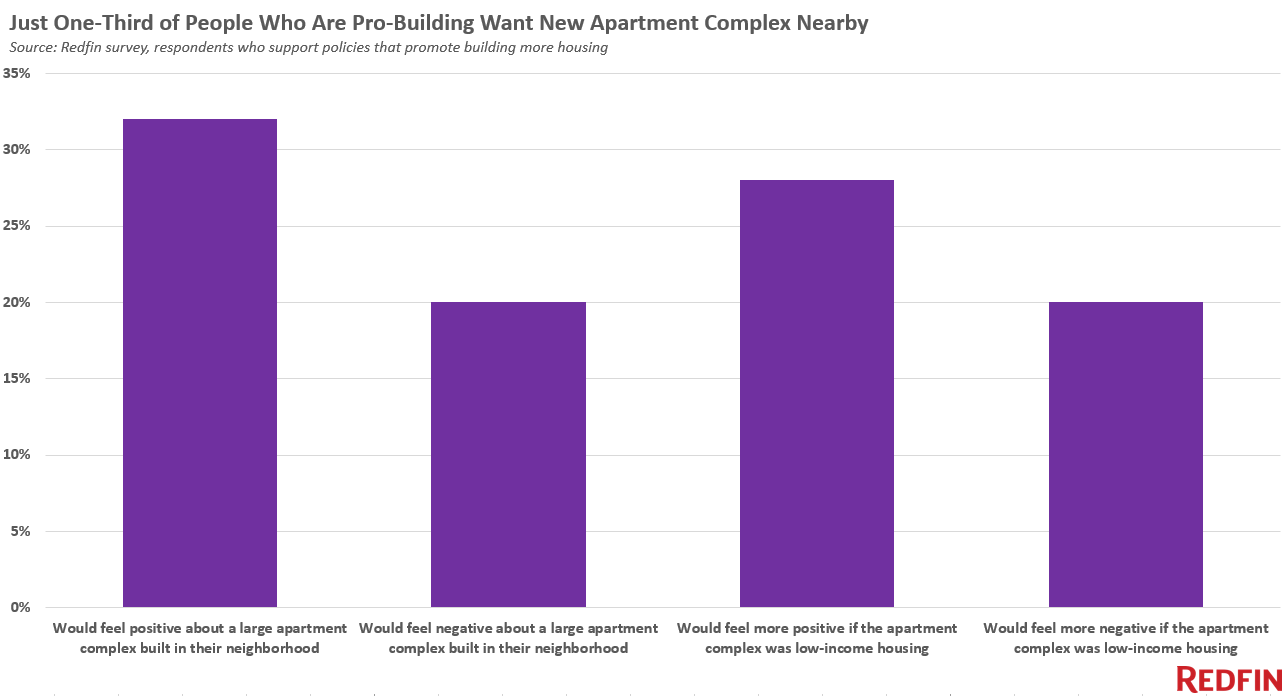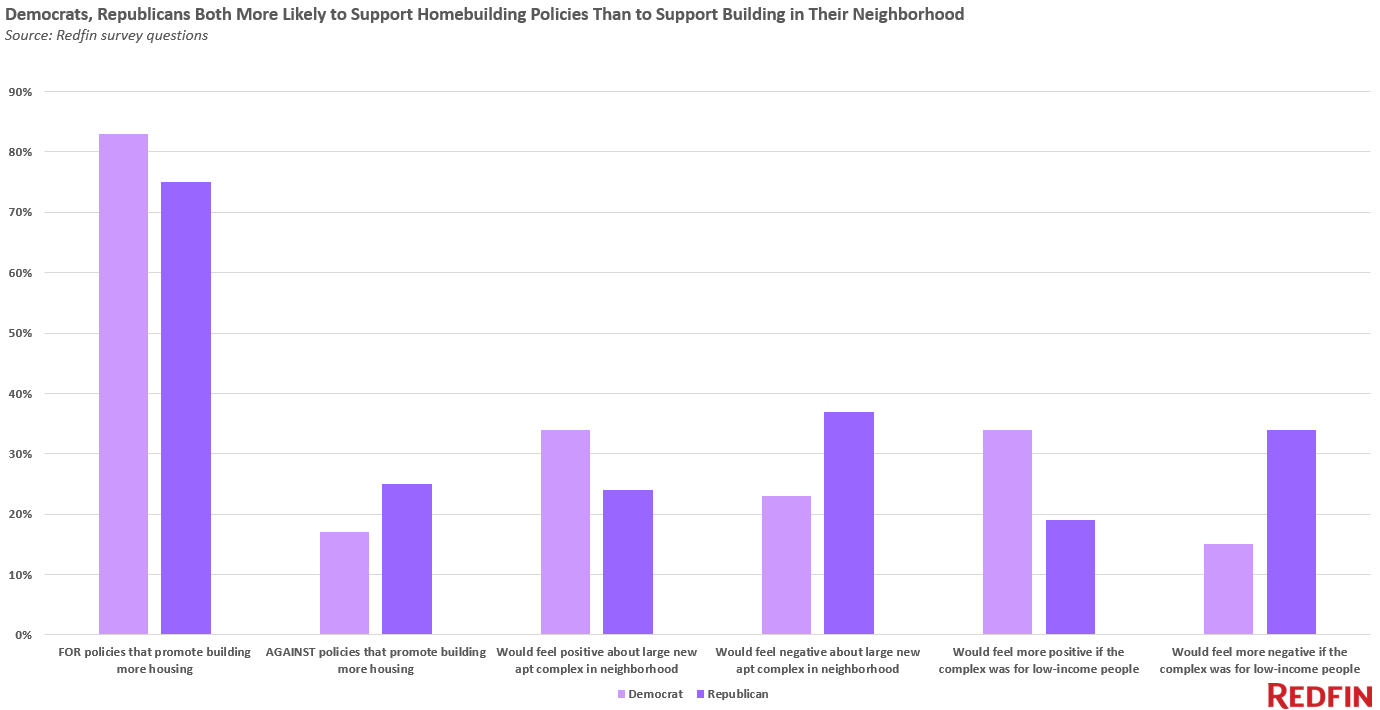Nearly 80% of respondents to a recent Redfin survey support policies that promote homebuilding. But just one-third of them would feel positive about a large new apartment complex built near their home.
Nearly four of every five (78%) respondents to a recent Redfin survey support policies that promote building more housing. But just one-third (32%) of the respondents who are pro-building would feel positive about an apartment complex built in their neighborhood, and 20% of them would be opposed to it. Nearly half (48%) would feel neutral.

This is according to a Redfin-commissioned survey conducted by Qualtrics in May and June 2023. The survey was fielded to 5,079 U.S. residents who either moved in the last year, plan to move in the next year, or rent their home. This report focuses mainly on the 3,949 respondents (78% of the total) who indicated they are “for” policies that promote building more housing. In addition to the question about whether respondents are for or against building promotion policies, this report hones in on two questions. 1) “How would you feel if a new large apartment complex were built in your neighborhood?” Respondents could choose “positive,” “neutral” or “negative.” 2) How would you feel if that new large apartment complex in your neighborhood was specifically built for low-income housing? Respondents could choose “more negative,” “same as any other large apartment complex,” or “more positive.”
Broken down by homeowners versus renters, 74% of owners support policies that promote building more housing, compared with 80% of renters. One-quarter (25%) of owners would feel positive about a new apartment complex built in their neighborhood, about on par with 28% of renters. Two in five (40%) owners would feel negative about a new apartment complex built in their neighborhood, and 35% would feel neutral. That’s compared with about one-quarter (24%) of renters feeling negative about the prospect of a new apartment complex nearby, and nearly half (49%) who would feel neutral.
The U.S. had an estimated housing shortfall of 3.8 million units as of 2021, and both buying and renting a home is more expensive in 2023 than it’s ever been. Prices continue to rise even in the midst of elevated mortgage rates and low demand because there aren’t enough homes. Building more housing would narrow the gap between supply and demand, and help make housing more affordable. Policies that promote building include loosening zoning restrictions, allowing accessory dwelling units (ADUs) and enacting tax incentives that would encourage developers to build.
“Personal preferences for things like a quiet neighborhood or old-fashioned charm are often at odds with building new housing,” said Redfin Chief Economist Daryl Fairweather. “Even though so many Americans believe in building new dense housing in theory, that ideology isn’t strong enough to outweigh their own desires–especially when they don’t stand to directly benefit from the building. That’s why it’s so difficult to overcome community opposition to dense new housing, even during a time when so many Americans believe in the Yes In My Backyard (YIMBY) movement.”
Most Democrats and Republicans are pro-building–but not necessarily in their neighborhood
Broken down by political affiliation, the majority of both Democrats and Republicans support policies that promote building more housing. But a minority of both Democrats and Republicans would feel positive about a new apartment complex built in their neighborhood.
More than eight of every 10 (83%) of respondents who identify as Democrats are pro-building, compared with three-quarters (75%) of respondents who identify as Republicans.

Roughly one-third (34%) of Democrats would feel positive about a large new apartment complex to be built in their neighborhood, compared with 24% of Republicans. Just under one-quarter (23%) of Democrats would feel negative about a large complex built in their neighborhood, versus 37% of Republicans. Roughly two in five Democrats (43%) and Republicans (40%) would feel neutral.
While Republicans are more likely than Democrats to be against a large new complex in their neighborhood, the South–which is made up largely of Republican-leaning states–is building far more homes than other parts of the country. States in the South issued 576,000 single-family building permits in August, more than twice as many as any other region and up 10% year over year. That’s compared to 4% increases in the West and Midwest and a 5% decline in the Northeast.
“There are YIMBYs and NIMBYs on both sides of the aisle,” Fairweather said. “That’s part of the reason it’s so difficult to push through policies that promote dense housing. But all types of building ultimately help with housing supply and affordability, even building more single-family homes. The more homes that exist, the more likely it is a person can find one to fit their needs and their budget. So even though Republicans are more likely to oppose dense housing, the South is doing more than other regions to create more housing and help with affordability. Looking forward, governments in some red and blue states are prioritizing affordable housing. In Montana, for instance, a wave of bipartisan legislation to reform zoning is making its way through the government, and California lawmakers have eliminated barriers to building ADUs.”
Democrats are nearly twice as likely as Republicans to feel more positive if the apartment complex being built in their neighborhood was for low-income residents. About one-third (34%) of Democrats say they would feel more positive if that were the case, compared to 19% of Republicans. About half of both groups would feel neutral.

 United States
United States Canada
Canada